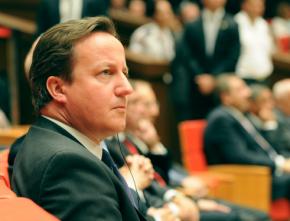Can we be independent of austerity?
Leaving Britain would mean no longer being ruled by a government that blames the poor for swiping all the wealth, writes Independent columnist .
I BET Prime Minister David Cameron regrets panicking about what the result of the Scottish referendum on independence was going to be now. By 5 a.m., he must have been screaming, "Oh shit, how much power have I offered them?"
Two days before the referendum, it seemed he was about to say, "Alright Scotland, you can have full independence, but only if you vote against independence." Alistair Darling, head of the Vote No campaign, looked as if he would go on Channel 4 News to announce, "Look, vote No and I'll get you a puppy. All right then, a meerkat. One each."
Then the party leaders screamed at each other, "Get Gordon Brown, they might listen to him." "But you called him a gibbering twat who literally dunked all the country's money in a pond of cat piss!" "I don't care, he doesn't sound posh and can shout. They like that up there, get him quick!"
Then they suddenly blurted out promises of extra powers, with no thought behind them at all, such as "Vote No and if you like you can be part of Brazil," so now they're all wondering how they're going to implement any of this.

They've even announced a timetable for introducing the new powers they haven't thought of, so the schedule is, "By as soon as next week, we'll have opened up a Word document. Over Christmas, we'll consult someone, maybe David Dickinson if he's not in pantomime. Then by January at the latest, we'll announce to Parliament that we've kicked it about a bit, then it should become law one afternoon."
Cameron must be thinking, "I wonder if we could get Lord Leveson to hold an inquiry? That should take us into the 34th century, then we can ignore the results from there."
ALREADY THERE are MPs promising to oppose bits of a bill that hasn't been thought up yet, grumbling, "There is no way I can agree to either a greater or lesser amount of anything, whatever it is or isn't, as this would make a mockery of our historic union, and ruin the lives of my constituents here in Surrey."
Many of them are grumbling that England will have no power left and needs its own parliament, and Cameron seems keen to satisfy them, so we'll end up with a system in which Scotland takes over on a Wednesday, or Holyrood can run things that begin with K. Then they'll start a war with Kenya and the whole thing will unravel again. But the biggest problem might be that extra bits of power, whatever they are, won't satisfy anyone, because the Yes vote didn't seem to be motivated mostly by nationalism.
For example, there was surprise that some areas where the Scottish National Party attracts high votes didn't support independence. This might seem peculiar--that thousands of people think, "The party I support is the Scottish nationalists. The only thing I don't agree with them on is Scottish nationalism."
And the Yes vote was often highest in the poorer areas, with little tradition of nationalism. Maybe this was because much of the Yes campaign, especially at a local level, was about issues such as the bedroom tax and preserving the National Health Service. Labour's John Reid complained about this on the results program, saying it was unfair to bring in "all sorts of other issues" like that.
And you can see what he means, because this referendum was supposed to deal with serious matters, not trivia such as being forced to move from your house.
For many who voted Yes, it appeared that what they wished to be independent from wasn't England but English austerity. Leaving Britain would mean no longer being ruled by a government that blames the poor for swiping all the wealth, and then gives it to the wealthy through new rules such as the bedroom tax.
So what a liberty to raise an issue like that in a referendum.
Also, had Scotland been independent, they wouldn't have been dragged into other bits of tittle-tattle like the Iraq War. These issues aren't nationalist, aren't even necessarily Scottish, and many who voted No would be as adamantly against them as those who voted Yes.
But they do suggest a way out of the constitutional puzzle we're in. The English should now have a referendum, in which the English decide whether we want to leave England or not. Yes campaigners can insist we have nothing against England, and even wish to remain on healthy terms with England, but we'd rather go our own way and no longer be dragged into wars and bedroom taxes and privatizations of railways and mail services. We might even come back one day, but for the time being, we'll set up our own country and start all over again, and if England won't let us keep the pound, we'll go into a currency union with Scotland.
Who could argue against that? Especially as the one part everyone seems able to agree on, and this started as soon as the high turnout was known, is the Scottish did really well. All night the politicians and commentators came on to say, "HAVEN'T we been good at voting? HAVEN'T we been good? YES we have, LOTS of you managed it DIDN'T you? Eighty-four percent--that's a LOT, YES it is. ALL on your own, you went ALL on your own and put the little cross in the box really, really well, you CLEVER things."
So the Scots are sure to be looked after from now on.
First published in the Independent.


